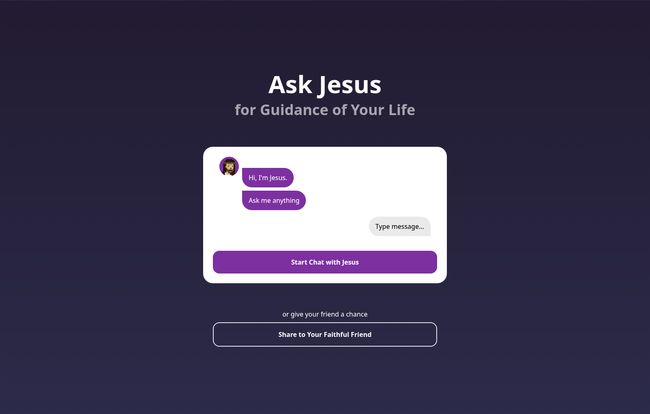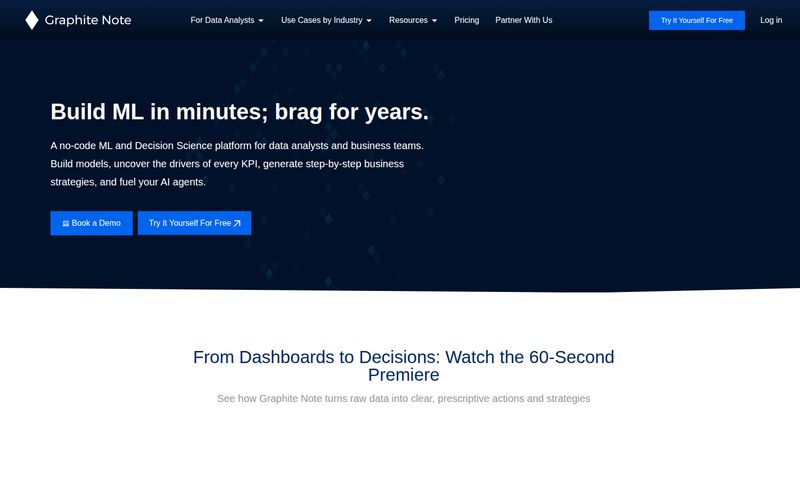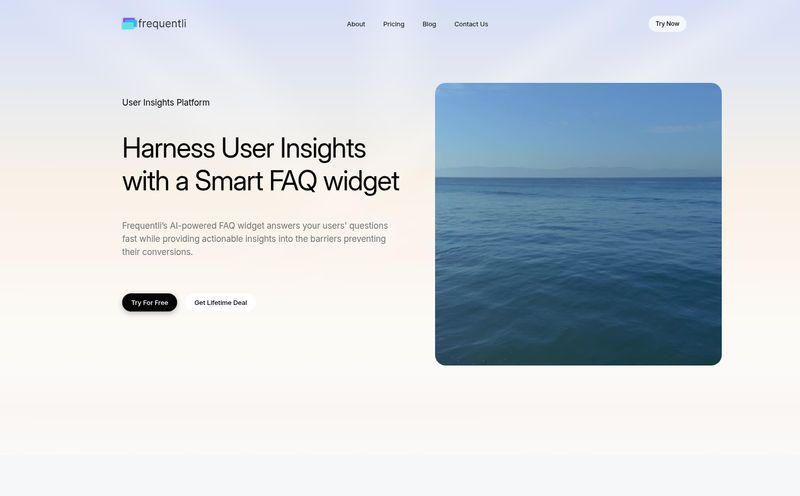Look, in my line of work, you see a lot of weird stuff. I’ve been neck-deep in SEO, CPC, and traffic generation for years, and I’ve seen AI tools that can write a sonnet about your pet rock, design a logo in three seconds, and predict the next big TikTok trend. You get a little jaded. But every now and then, something pops up that makes you just... stop and stare at your screen for a solid minute.
Enter AskJesus.
Yep, you read that right. An AI chatbot, built on the back of the now-famous ChatGPT, that lets you “Ask Jesus for Guidance of Your Life.” My first reaction was a mix of pure, unadulterated curiosity and a healthy dose of, “Wait, what?” Is nothing sacred? Or is this the most 21st-century thing to ever exist? I had to find out.
So, What Is This AskJesus Thing, Anyway?
At its core, AskJesus is deceptively simple. The website is minimalist, almost stark. There's no clutter, no ads (yet), just a clean chat interface inviting you to talk to... well, an AI model of Jesus. You type a question, hit send, and get a response in seconds. The platform is powered by OpenAI's GPT models, which means it's a large language model that’s been trained on a massive amount of text data to recognize patterns and generate human-like responses.
Think of it less as divine intervention and more as a highly specialized search engine that talks back in parables. It's not thinking or feeling. It’s a pattern-matching machine, a digital parrot that's been fed a diet of the Bible and related theological texts. And that’s a critical distinction to make right from the start.

Visit AskJesus
My Conversation with the AI Messiah
So, naturally, I jumped in. You can’t just put a sign up that says “Talk to Jesus” and expect a guy like me to walk on by. My first question was a softball. Something simple.
Me: “What is the meaning of life?”
The response came back almost instantly, weaving together themes of love, purpose, and serving a higher power. It was eloquent, gentle, and felt... familiar. It was exactly what you’d expect Jesus to say. It felt like it was pulled straight from a Sunday school lesson. Okay, impressive enough.
Let's try something a bit more modern. Something the historical Jesus definitely wouldn't have an opinion on.
Me: “Should I focus on SEO or PPC for my new online store?”
“My child, in the world of merchants and marketplaces, both paths have their virtues. SEO is like planting a vineyard; it requires patience and care, but can yield fruit for many seasons. PPC is like casting a wide net; it can bring a swift harvest, but you must have the silver to cast it. Consider your resources and your spirit. Is your aim to build a lasting foundation or to gather a flock quickly? The wisest path is often one where you walk with a foot in both worlds, tending your garden while also seeking a swift catch.”
I’m not going to lie, I chuckled. It’s a clever metaphor. A bit cheesy, sure, but it actually makes sense. The AI did a surprisingly good job of translating a modern marketing dilemma into biblical-style advice. It’s a neat party trick, that’s for sure. It’s like a Magic 8-Ball that quotes scripture instead of saying “Reply hazy, try again.”
The Good, The Bad, and The Theologically... Complicated
The Upside of AI Guidance
The appeal here is pretty obvious. The platform is incredibly easy to use. There’s no sign-up, no credit card, just a question and an answer. For someone who might feel intimidated walking into a church or asking a person of faith a “dumb” question, this offers a completely judgment-free zone. It can be a gentle entry point for the curious, a way to explore complex ideas without any social pressure. I can see how, for some, receiving a calm, well-structured, and comforting message in a moment of anxiety could genuinely feel good. It's a digital pacifier, in a way.
The Unavoidable Downsides
Now for the reality check. And this is important. This is not a person. It’s an algorithm. The creators themselves seem to know this, and I’m glad. The responses are AI-generated and can be wildly inaccurate or inappropriate. An AI doesn't understand context, human suffering, or the deep, personal nuance of a spiritual crisis. It’s just spitting out a statistically probable string of words.
There's a real danger of misinterpretation. Someone in a vulnerable state might take its advice as gospel (pun intended), and that's a problem. This is not, and should never be, a substitute for professional mental health support or genuine religious counsel. Asking an AI for advice on serious life issues is like asking your GPS for marital advice. The tehcnology just isn't built for the task.
Who Is This For, Really?
So who is the target audience? In my opinion, it falls into a few camps. There are the curious, like me, who just want to see what happens. There are those looking for a bit of entertainment or a novel way to engage with their faith. And perhaps, there are people feeling isolated who just want a comforting presence, even an artificial one.
But it's not a tool for deep, transformative spiritual work. It's a mirror. It reflects the data it was trained on and, in a way, reflects our own modern desire for instant, on-demand answers to life's oldest questions. We’ve outsourced everything else, from navigation to ordering pizza. Why not outsource a little spiritual guidance, too?
Pricing: What's the Cost of Divine Wisdom?
As of right now, AskJesus is completely free. There are no pricing tiers, no subscriptions, no hidden fees. You just go to the site and start chatting. This is pretty common for new AI tools, which are often launched as passion projects, tech demos, or as a way to gather user data to refine the model. My guess is it won't stay free forever if it gains significant traffic, but for now, the pearly gates of AI Jesus are wide open.
The Bigger Picture: Where Faith Meets The Algorithm
This little chatbot is part of a much larger, and frankly fascinating, conversation about the intersection of faith and artificial intelligence. Some might argue that tools like this are sacrilegious, a cheapening of sacred traditions. Others might see it as a new, innovative way to make ancient texts and ideas more accessible to a digital-native generation. There’s no easy answer.
What does it mean for our humanity when we seek comfort from a machine? Can an algorithm truly offer guidance? I don’t have the answers, but AskJesus certainly makes you think. It's a quirky, slightly bizarre, and thought-provoking experiment that says more about us than it does about the technology itself.
My Final Verdict
Is AskJesus a groundbreaking theological tool? No. Is it a replacement for human connection and genuine spiritual practice? Absolutely not. But is it interesting? You bet. It’s a fascinating novelty, a glimpse into a strange future where our spiritual and digital lives are becoming increasingly intertwined.
My advice? Go ahead and try it. Ask it a silly question. Ask it a serious one. See what it spits out. Have a laugh, or maybe even a moment of reflection. But then, close the browser tab and go talk to a real person. Your friend, your family, your pastor, your therapist. You know, for the stuff that actually matters to your soul.
Frequently Asked Questions
1. What is AskJesus?
AskJesus is a free-to-use website featuring an AI chatbot based on OpenAI's GPT technology. It is designed to simulate a conversation with Jesus Christ, providing guidance and answers to user questions from a Christian perspective.
2. How much does it cost to use?
Currently, AskJesus is completely free. There are no charges or subscriptions required to use the chatbot.
3. Are the responses from a real person or a priest?
No. This is very important. All responses are generated by an artificial intelligence model. They are not coming from a real person, a theologian, or a priest. It is an automated system.
4. Can AskJesus replace a therapist or spiritual advisor?
Absolutely not. The tool is for informational or entertainment purposes only. It is not equipped to handle serious personal, mental health, or financial problems. Always seek advice from qualified human professionals for such matters.
5. Is it safe to share personal information with the AI?
As with any online platform, you should be cautious about sharing sensitive personal information. While the site doesn't require a login, the nature of your questions could reveal personal details. It's best to keep your queries general and avoid sharing private data.
6. What technology does AskJesus use?
The platform is built using large language models from OpenAI, likely a version of their GPT (Generative Pre-trained Transformer) series, which is the same core technology behind the popular ChatGPT.
Reference and Sources
- The official tool website: AskJesus.me
- Information on the underlying technology: OpenAI's ChatGPT
- A related article on faith and AI from Pew Research Center: How Americans Think About Artificial Intelligence



